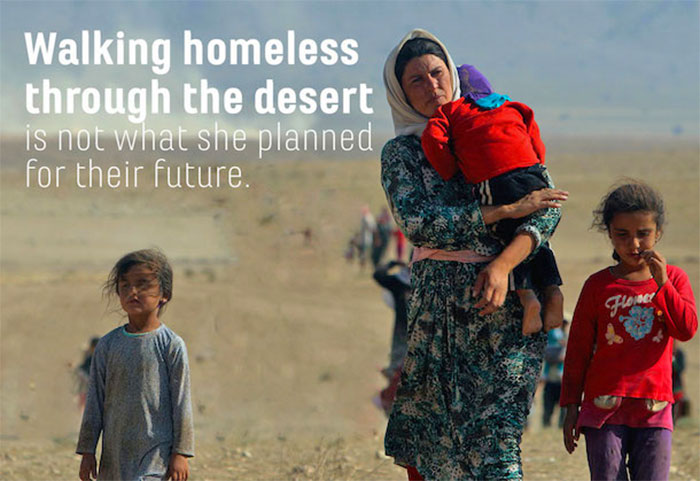WHAT WOULD YOU DO?
4 000 000 people have been forcefully removed from their homes. This staggering figure relates to Syria only. Many more thousands people decide every day to risk deadly journeys across the Mediterranean.
Why do people have to risk their lives in order to reach safety? The answer is that there are very few legal routes to the UK or other European countries. No ‘asylum visas’ are offered by the UK government. All our politicians are doing in response to the crisis is building the walls of fortress Europe higher and higher.
Sophie Hurndall, Key Relationship Manager at the British Refugee Council has sent us an expert insight. Make sure you take the opportunity to call on your MP to do his job and act for once as a responsible and true politician. Please join our call today.
You’re 19 years old. You have your whole life ahead of you. But instead of planning which university you’re going to go to, you’re trying to cope with recurrent nightmares that leave you paralysed in fear. When dawn arrives, your night-time fears are quickly replaced by worrying about whether you, your Mum and your younger sister will have enough food today.
Three years ago you were forced to flee your home in Syria and since then you and your family have been subsisting in Lebanon. Not allowed to work, with the family savings dwindling, daily life is a struggle. But there is a glimmer of hope. Your father is in the UK and is trying to bring you, your sister and your Mum to live with him there in safety. He left months ago but the hope of a new life where your sister can go to school and you can continue your studies keeps you going.
It’s hard to imagine how you would feel when the news arrives that at last your family reunification application has been approved – for your Mum and your sister – but not for you. The UK rules around family reunion for refugees are strict – you are no longer a child and therefore not entitled to join your father. Your family take the only option available to them and use the remainder of their savings to pay a smuggler to get you to the UK. You face the prospect of a long and extremely dangerous journey where drowning in the Mediterranean is one risk among many.
More and more people are being forced to make this sort of impossible decision every day. We are living in a time when more people have been forced to flee their homes than at any time since the Second World War. This global refugee crisis is being fuelled by the conflict in Syria, where half the country is on the move in search of a safe haven. New UNHCR figures out last week showed that a staggering 4 million people have been forcibly displaced, making Syrians the biggest refugee population in a generation.
Syrians are also the largest group making the deadly journey across the Mediterranean Sea to Europe. But they are not the only refugees boarding unseaworthy boats in the hope of making it to our shores. Afghans, Eritreans and Somalis, amongst others, travel alongside them.
When people are forced to flee because of conflict or persecution, it is often many years before they are able to find a safe place where they can begin to rebuild their lives. In their search for safety, they are often forced to survive in precarious and dangerous circumstances and take perilous journeys. Some are trying to cross the Mediterranean in the hope of finding refuge in Europe.
But there are very few legal routes for refugees to the UK or other European countries. The UK does not offer an ‘asylum visa’ and when war breaks out and people begin fleeing a country like Syria for example, other types of visas, such as student or visitor visas, will be refused if the authorities believe there is an intention to claim asylum upon arrival.
That’s why the Refugee Council is calling for the Government to respond to the growing global refugee crisis by helping as many people as possible reach safety. One way it can do this is to make it easier for refugees to reunite with their relatives already living in safety in the UK. Under current rules, refugees are only allowed to bring their husband or wife and dependant children under the age of 18. Even those that fit our narrow definition of family often face long delays living apart, with usually the women and children surviving in desperate conditions while they wait for a decision on their application. Or still worse, they are refused because they cannot provide the right documentation. If you had bombs raining down on your house, would you think to pick up your marriage certificate?
With peace and stability in short supply across the world, the only way to prevent men, women and children who’ve fled for their lives once, risking their lives again on hazardous journeys is to extend a lifeline by providing alternative routes to safety.




“No ‘asylum visas’ are offered by the UK government” Vivienne westwood says …a voice worth to be heard, we love you vivienne
Comment by Anonymous on 07/08/2015 at 7:31 pm